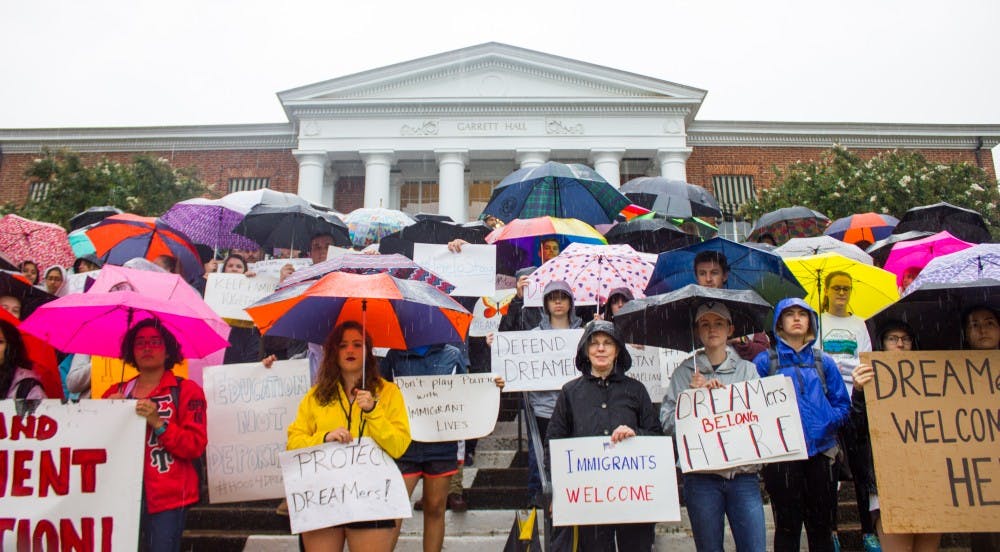In response to a rally we held on Nov. 1, Opinion columnist Benjamin Burke published an opinion in The Cavalier Daily making several assertions about immigration we hope to respectfully address. Before beginning, we wanted to briefly thank Mr. Burke for sharing his opinion and contributing to the national conversation surrounding undocumented immigrants and their future in America.
Burke’s column made four key points. First, he stated amnesty (i.e. legalization of undocumented immigrants) carries massive political stakes in terms of its potential to change demographics in favor of Democrats electorally, and that he doubted the ethics of politicians espousing it. Second, he cited potential harms to native-born Americans in the form of lower wages, implying the core of any legalization policy would be tainted by a type of corporatism. Third, he argued “lax immigration policy” is an ineffective global poverty alleviation tool. Fourth, he argued immigration robs countries sending immigrants of human capital. All of these, he argued, should supersede “moralistic calls” for legalization, like the ones espoused by our walk-out on Nov. 1. However, each of these claims has serious shortcomings.
Burke’s first point rests on the example of California, a state Republicans used to win and one Burke feels is now Democratic for the foreseeable future, largely due to the rise of its now majority Latinx population. The implication is that legalization would be politically harmful to Republicans because it would increase the population of Democrat-voting Latinx citizens. Consequently, politicians espousing legalization act in self-interest, not sincerity.
The smaller problem with this argument is that it is overly cynical. Simply because a politician supports legalization does not mean they have a political endgame in mind, especially since support often comes from moderate Republicans who apparently have nothing to gain. Moreover, the premise of Burke’s argument is that Latinxs are predestined to vote for Democrats no matter what, implying limited individual agency and absolving Republicans of any culpability in creating the status-quo in California. One could argue California Republicans made avoidable political decisions that produced short-term victories at the cost of long-term losses, with efforts such as Proposition 187. Finally, Burke’s position is tantamount to creating an ideological litmus test for immigration policy, something we are uncomfortable with.
The larger problem with Burke’s analysis, however, is that it assumes legalizing the undocumented means giving them citizenship. We are not naïve. The electoral ramifications of legalization are heavy in the minds of detractors, and our highest priority objective is simply to alleviate the pain. For decades, undocumented communities have experienced deep cruelties in almost uniform silence that cannot be adequately expressed in words. If ending them means legalization without voting rights, so be it. There are ways to compromise around Burke’s electoral concerns entirely.
Burke’s second point rests on the key premise that undocumented immigrants reduce wages for native-born citizens, which he supports by citing George Borjas, the most prominent advocate of this view among economists. According to Burke, immigration leads to cheap labor that is exploited by capital to the detriment of native-born citizens. Our main issue with this assertion is that other economists disagree with Borjas. Gianmarco Ottaviano and Giovanni Peri, for example, find positive long run wage effects on citizens of all skill levels. This result makes sense when you realize immigrants and citizens are not likely to be substitutes in the labor market, especially when factoring in English proficiency.
But suppose for the moment that Borjas is right. Borjas’ work essentially says the total long run wage effect of 17 million documented and 12 million net undocumented immigrants entering the United States from 1990 to 2006 is zero percent for all native-born citizens and -4.8 percent for those without a high school degree, with other skill groups varying from -0.5 percent to 1.2 percent. Essentially, the least skilled lose by about five percent and everyone else is a wash (a revised Borjas estimate from 1990 to 2010 has this down to -1.7 percent. If that is true, why not simply create an “immigrant tax” and adjust the -4.8 percent to zero through redistribution? Why is an easily solvable -4.8 percent drop, heavily contradicted by other economic data and likely nonexistent, enough to cloud the moral presumption Burke concedes legalization carries? In our view, common electoral or economic objections to legalization are portrayed as more intractable than they truly are. Similarly, Burke’s argument that undocumented immigrants have a net negative fiscal effect due to benefits received — also very debatable — is not really an argument against legalization, it is an argument against government benefits.
Third, Burke objects to immigration on the grounds that it is a poor global poverty alleviation tool. But why is global poverty alleviation the yardstick against which the effectiveness or desirability of immigration policy is measured? Why can’t the many positive contributions immigrants make to America be the yardstick? Even if you measure in terms of poverty alleviation, remittances to home countries arguably make immigration one of the most effective global poverty reduction tools in history, often comprising a large percentage of developing countries’ GDP.
Finally, Burke asserts America’s “weak stance on immigration” robs countries of origin of human capital, because the most ambitious or talented are inclined to leave. This seems like an odd objection to make — why would we not want the best? It is also unlikely other developed countries would follow Burke’s voluntary surrender of human capital, meaning these individuals would leave home either way and simply end up our competition. Moreover, countries of origin don’t own their citizens, who have an individual agency beyond their nationality. And those citizens are also less likely to achieve the same productivity in their home countries. Ultimately, we fear this line of thinking will simply shrink American wealth without producing any foreign development.
To conclude, asserted “practical” arguments against legalization and our Nov. 1 walkout have significant caveats, and legalization is a policy that is both morally and practically beneficial to the United States.





